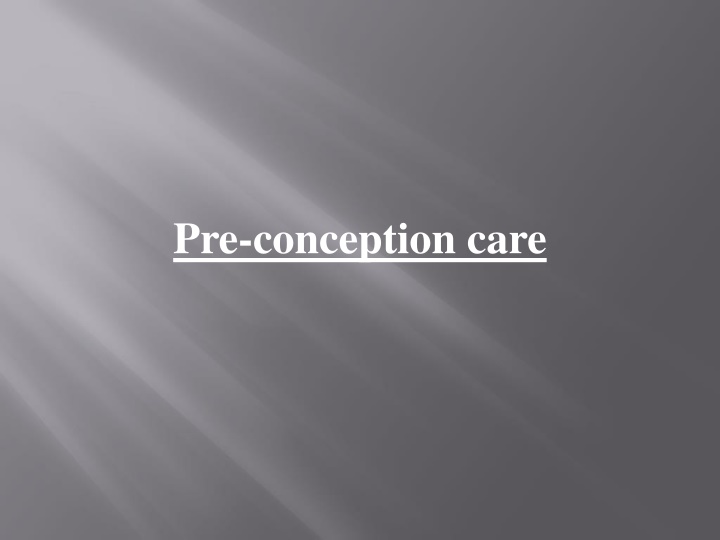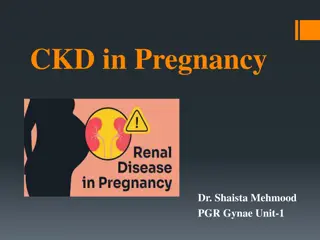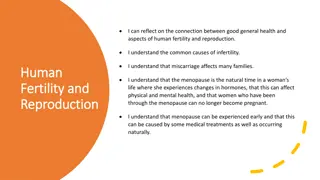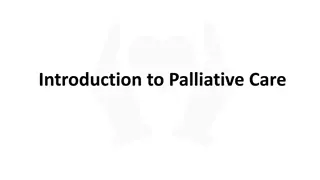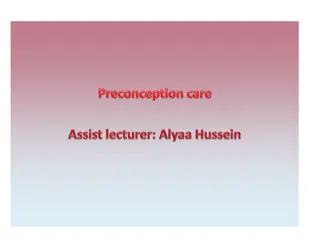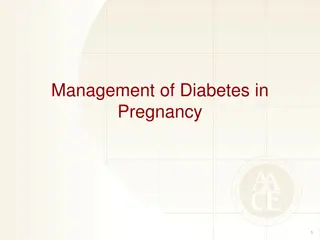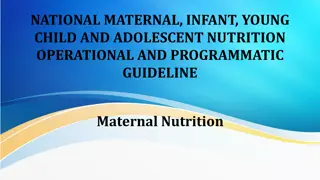Pre-conception care
Preconception care involves biomedical, behavioral, and social interventions for women and couples before conception to address health issues and risk factors. It aims to improve maternal and child health outcomes. Elements include health education, counseling, nutritional care, vaccination, family planning, and referral management. Recommendations focus on early antenatal care, genetic counseling, and preventive measures for hereditary diseases.
Download Presentation

Please find below an Image/Link to download the presentation.
The content on the website is provided AS IS for your information and personal use only. It may not be sold, licensed, or shared on other websites without obtaining consent from the author.If you encounter any issues during the download, it is possible that the publisher has removed the file from their server.
You are allowed to download the files provided on this website for personal or commercial use, subject to the condition that they are used lawfully. All files are the property of their respective owners.
The content on the website is provided AS IS for your information and personal use only. It may not be sold, licensed, or shared on other websites without obtaining consent from the author.
E N D
Presentation Transcript
Out lines: - Introduction. - Definition of preconception care. - Elements of preconception care. - Recommendations for Improving Preconception Health and Health Care.
Introduction: Preconception care is the provision of biomedical, behavioral and social interventions to women and couples before conception occurs to address health problems, behaviors that could lead to health problems, and individual or environmental risk factors that could contribute to maternal or childhood mortality and morbidity. Its ultimate aim is improved maternal and child health outcomes . Preconception care covers the period before a first pregnancy occurs, and between two pregnancies.
Definition: * Preconception care: is the service to the woman before she conceives. * Preconception care: is defined as a set of interventions that aim to identify and modify biomedical, behavioral and social risks to the woman's health or pregnancy outcome through prevention and management.
Elements of Preconception care : 1.Health education and counseling. 2.Nutritional care. 3.Rubella vaccination. 4.family planning. 5.Management of case and referral.
1-Health education and counseling Health education cover topics related to family life and reproductive health in general: The future parent advised about appropriate time for the first pregnancy (too young mother should advice to postpone the first pregnancy to the age of 18 years at least) The importance of antenatal care visit early in pregnancy. Precautions to be taken in pregnancy (to avoid taking any drugs or be exposed to any other teratogenic hazards. Counseling is directed to specific at risk factors or health problems, either related to the health of the individual him/herself, or to the future children. Genetic counseling to advise the parents about the probabilities of having congenital or hereditary disease
This is of two typesprospective counseling and retrospective counseling. 1. Prospective counseling: This is true prevention: A heterozygous individual with recessive traits should not marry another heterozygous individual. Diseases like thalassemia, sickle cell anemia are prevented 2. Retrospective counseling: This is done, when a hereditary disorder has already occurred in the family e.g avoiding exposure to X-rays, ionizing radiations, etc. treatment of hemophilia with anti-hemophilic globulin, etc.
3-Rubella vaccination: Vaccination should be done at least three months before pregnancy. (Not applicable in Egypt) 4-Family planning: The availability of modern effective method for family planning. Good birth spacing is essential for the health of children. Social considerations include the stability of marriage and the economic costs of child rearing.
5-Management of cases and referral: If any clinical condition is discovered during the premarital screening o Pre-conception care for specific categories of women: 1. Women with chronic medical diseases. 2. Women at risk of infection. 3. Women at risk of genetic diseases. 4. Women with a bad obstetric history.
Recommendations for Improving Preconception Health and Health Care: 1. Public awareness. Increase public awareness of the importance of preconception health behaviors and increase individuals use of preconception care services using information and tools appropriate across varying age, literacy, health literacy, and cultural/linguistic contexts. 2. Preventive visits. As a part of primary care visits, provide risk assessment and counseling (education and health promotion) to all women of child-bearing age to reduce risks related to the outcomes of pregnancy.
1. Interventions for identified risks. Increase the proportion of women who receive interventions as follow up to preconception risk screening, focus in on high priority interventions. 2. Pre-pregnancy checkups. Offer, as a component of maternity care, one pre-pregnancy visit for couples planning pregnancy 3. Inter-conception care. To provide intensive interventions to women who have had a prior pregnancy ending in adverse outcome.
1.Health coverage for low-income women. Increase Medicaid coverage among low-income women to improve 2.Improve access to preventive women s health, preconception, and inter conception care. 3.Public health programs and strategies. 9-monitoring improvements. Maximize public health surveillance and related research mechanisms to monitor
